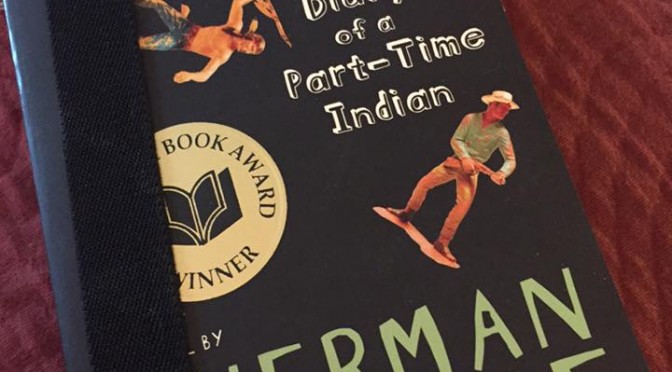I was required to take a contemporary literature course while in graduate school. I dreaded the class. I was a medievalist who dabbled in the Romantic period but contemporary literature was way outside of my comfort zone. That class proved to do what it was intended to – expand my literary horizons. And it was in that class that I read “Reservation Blues” by Sherman Alexie. A gut-wrenching, brutally realistic tale of living on an Indian reservation. That book clung to me like a sweaty t-shirt. It made me uncomfortable and introspective and I was left emotionally rattled. To this day it sits on my book shelf taunting me to forget about it.
So when I started reading about books getting banned at local schools and that “The Absolutely True Diary of a Part-Time Indian” by Sherman Alexie had made the list, I was curious. I knew this man to be an amazing, thought-provoking story writer and so I was eager to see what his stab at youth fiction produced.
The book starts simply, written in first-person from the perspective of a 14 year old boy. By page 10 — yes, 10 pages in — we are hearing this young boy talk about poverty. But not poverty as some abstract idea, but the ugly, honest, difficult reality of poverty. And no, it isn’t about going to bed hungry, it is about having to shoot your own dog because you can’t afford the vet bills. It is about living with the consequences of generations of poverty.
“Dad just looked down at me with the saddest look in his eyes. He was crying. He looked weak. I wanted to hate him for his weakness. I wanted to hate Dad and Mom for our poverty. I wanted to blame them for my sick dog and for all the other sickness in the world. But I can’t blame my parents for our poverty because mother and father are the twin suns around which I orbit and my world would EXPLODE without them.
And it’s not like my mother and father were born with wealth. It’s not like they gambled away their family fortune. My parents came from poor people who came from poor people who came from poor people, all the way back to the first poor people”
And this is how the book starts and you know right away that this book is going to change you. Arnold, our 14 year old guide to life on the reservation, is a typical 14 year old. He plays basketball, develops crushes on girls, is interested in the female anatomy, he cusses, and burps. But he’s also smart, and is desperate to escape the poverty that threatens to consume him.
I cried for Arnold at the end. Not loud shaking sobs, but quiet tears that streamed down my face out of helplessness. The knowledge that there are thousands of kids like Arnold and perhaps we all choose to be blind to them.
As an English teacher would I use this in my classroom (now aware of the curse words, references to masturbation, and girls boobs)? A resounding YES. I absolutely would use this as a teaching tool in a classroom. Oh sure the kids could read “Oliver” if we wanted to teach them about poverty – but that tells a story about a reality that happened over a hundred years ago in a country that isn’t even our own, which would keep the idea of poverty removed and abstract. No, “The Absolutely True Diary of a Part-Time Indian” brings poverty home. It strips us of all abilities to deny poverty’s existence and for that reason alone I would have every 14-16 year old I know read this book.

